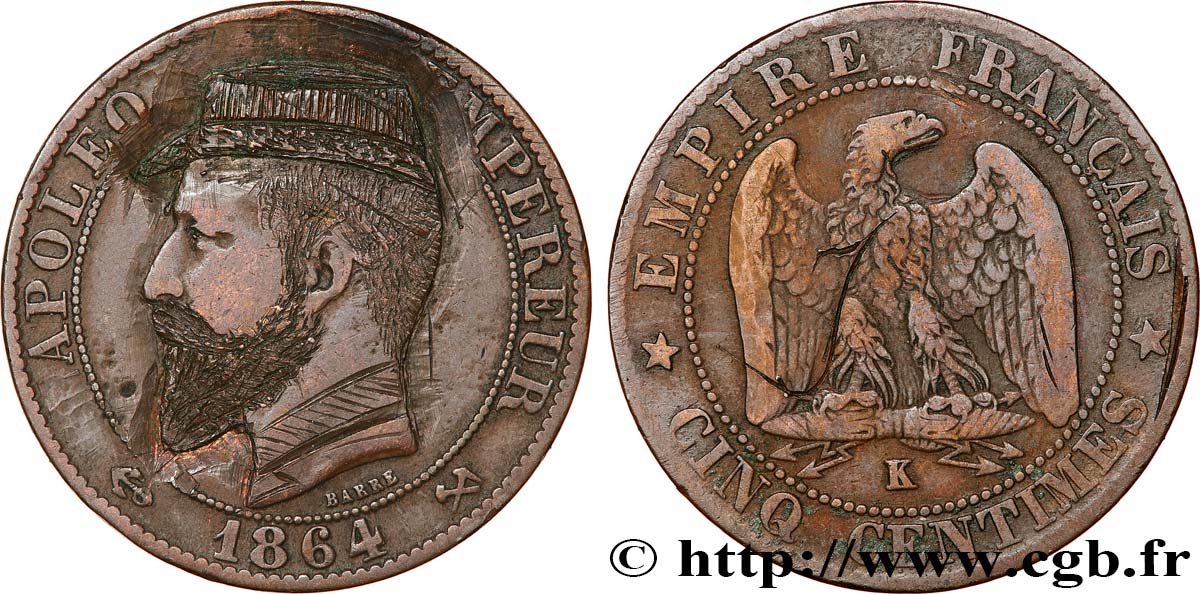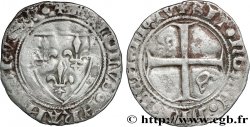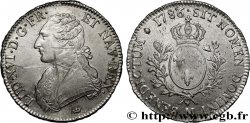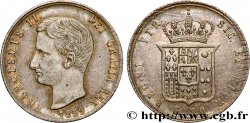Live auction - fmd_608786 - Cinq centimes Napoléon III, tête laurée, satirique pour le Général Boulanger 1864 Bordeaux F.117/15 var.
Чтобы принять участие в торгах, вы должны войти в систему и стать подтвержденным участником аукциона. Войдите, чтобы сделать ставку. Ваш аккаунт будет подтвержден в течение 48 часов. Не ждите до закрытия торгов, чтобы зарегистрироваться.Сделав ставку на данный товар, вы вступаете в юридическое соглашение на покупку выбранного товара и нажатием кнопки «Сделать ставку» подтверждаете принятие вами условий интернет-аукционов cgb.fr.
Ставка может бить сделана только в полном эквиваленте евро. Торги закроются согласно времени, указанному в описании товара, все ставки, сделанные после закрытия торгов, учитываться не будут. Не следует откладывать предложение вашей ставки до последнего момента, так как система может не успеть обработать вашу заявку, и ваша ставка не будет принята. Более детальную информацию вы найдёте здесь: FAQ по интернет-аукционам.
Все ставки победителей подлежат комиссии 18%.
Все ставки победителей подлежат комиссии 18%.
| Оценить : | 250 € |
| Цена : | 125 € |
| Максимальная предлагаемая цена : | 125 € |
| Конец торгов : | 24 October 2023 18:12:04 |
| Участников : | 1 Участников |
Тип Cinq centimes Napoléon III, tête laurée, satirique pour le Général Boulanger
Дата: 1864
Монетный двор / Город: Bordeaux
Количество отчеканенных монет: ---
Металл: bronze
Диаметр: 25 mm
Ориентация осей монеты: 6 h.
Вес: 4,62 g.
Век: lisse
Редкость: R2
Ссылки в каталоге: :
Лицевая сторона
Аверс: легенда: NAPOLEON III - EMPEREUR// 1864.
Аверс: описание: La tête de Napoléon III à gauche regravée à l’image du Général Boulanger avec képi, barbe et moustache, col de général, au-dessous BARRE ; le tout dans un grènetis.
Обратная сторона
Реверс: легенда: EMPIRE - FRANÇAIS// * CINQ CENTIMES *.
Реверс: Описание: Aigle debout sur un foudre, les ailes ouvertes, la tête tournée à droite ; au-dessous K.
Комментарий
Les monnaies satiriques sont plus rares sur des modules de Cinq Centimes ; c’est la première fois que nous en proposons une à l’effigie du Général Boulanger.
Georges Boulanger, officier général et homme politique, est né le 29 avril 1837 à Rennes et est mort le 30 septembre 1891 à Ixelles en Belgique. Il est ministre de la Guerre (parti républicain) de 1886 à 1887. Il est connu pour avoir ébranlé la Troisième République, porté par un mouvement portant le nom de boulangisme. Sa popularité est due à divers coups d'éclat et des circonstances peu banales : il réussit à faire expulser du gouvernement le duc D'Aumale, il soutient les mineurs grévistes et invite l'armée envoyée contre eux de se joindre à leur mouvement, il améliore les conditions des soldats... Après avoir réussi à rassembler autour de lui tous les mécontents, de l'extrême gauche à la droite dure et nationaliste, il est triomphalement élu dans plusieurs départements (ainsi qu'à Paris) mais, bien qu’appuyé par tous, il renonce, en 1889, à faire le coup d'État qui l’aurait porté au pouvoir et s'enfuit en Belgique. Condamné à la prison à perpétuité par contumace, il se suicide sur la tombe de sa maîtresse.
Satirical coins are rarer on Cinq Centimes modules; this is the first time we have offered one with the image of General Boulanger..
Georges Boulanger, general officer and politician, was born on April 29, 1837 in Rennes and died on September 30, 1891 in Ixelles, Belgium.. He was Minister of War (Republican Party) from 1886 to 1887. He is known for having shaken the Third Republic, carried by a movement called Boulangism.. His popularity was due to various coups and unusual circumstances: he succeeded in having the Duke of Aumale expelled from the government, he supported the striking miners and invited the army sent against them to join their movement, he improved the conditions of the soldiers. . . Having succeeded in gathering around him all the discontented, from the extreme left to the hard and nationalist right, he was triumphantly elected in several departments (as well as in Paris) but, although supported by all, he renounced, in 1889, the idea of carrying out the coup d'état which would have brought him to power and fled to Belgium.. Sentenced to life imprisonment in absentia, he committed suicide on his mistress's grave
Georges Boulanger, officier général et homme politique, est né le 29 avril 1837 à Rennes et est mort le 30 septembre 1891 à Ixelles en Belgique. Il est ministre de la Guerre (parti républicain) de 1886 à 1887. Il est connu pour avoir ébranlé la Troisième République, porté par un mouvement portant le nom de boulangisme. Sa popularité est due à divers coups d'éclat et des circonstances peu banales : il réussit à faire expulser du gouvernement le duc D'Aumale, il soutient les mineurs grévistes et invite l'armée envoyée contre eux de se joindre à leur mouvement, il améliore les conditions des soldats... Après avoir réussi à rassembler autour de lui tous les mécontents, de l'extrême gauche à la droite dure et nationaliste, il est triomphalement élu dans plusieurs départements (ainsi qu'à Paris) mais, bien qu’appuyé par tous, il renonce, en 1889, à faire le coup d'État qui l’aurait porté au pouvoir et s'enfuit en Belgique. Condamné à la prison à perpétuité par contumace, il se suicide sur la tombe de sa maîtresse.
Satirical coins are rarer on Cinq Centimes modules; this is the first time we have offered one with the image of General Boulanger..
Georges Boulanger, general officer and politician, was born on April 29, 1837 in Rennes and died on September 30, 1891 in Ixelles, Belgium.. He was Minister of War (Republican Party) from 1886 to 1887. He is known for having shaken the Third Republic, carried by a movement called Boulangism.. His popularity was due to various coups and unusual circumstances: he succeeded in having the Duke of Aumale expelled from the government, he supported the striking miners and invited the army sent against them to join their movement, he improved the conditions of the soldiers. . . Having succeeded in gathering around him all the discontented, from the extreme left to the hard and nationalist right, he was triumphantly elected in several departments (as well as in Paris) but, although supported by all, he renounced, in 1889, the idea of carrying out the coup d'état which would have brought him to power and fled to Belgium.. Sentenced to life imprisonment in absentia, he committed suicide on his mistress's grave








 Cообщить об ошибке
Cообщить об ошибке Распечатать страницу
Распечатать страницу Отправить мой выбор
Отправить мой выбор Задать вопрос
Задать вопрос Consign / sell
Consign / sell
 Информация
Информация















